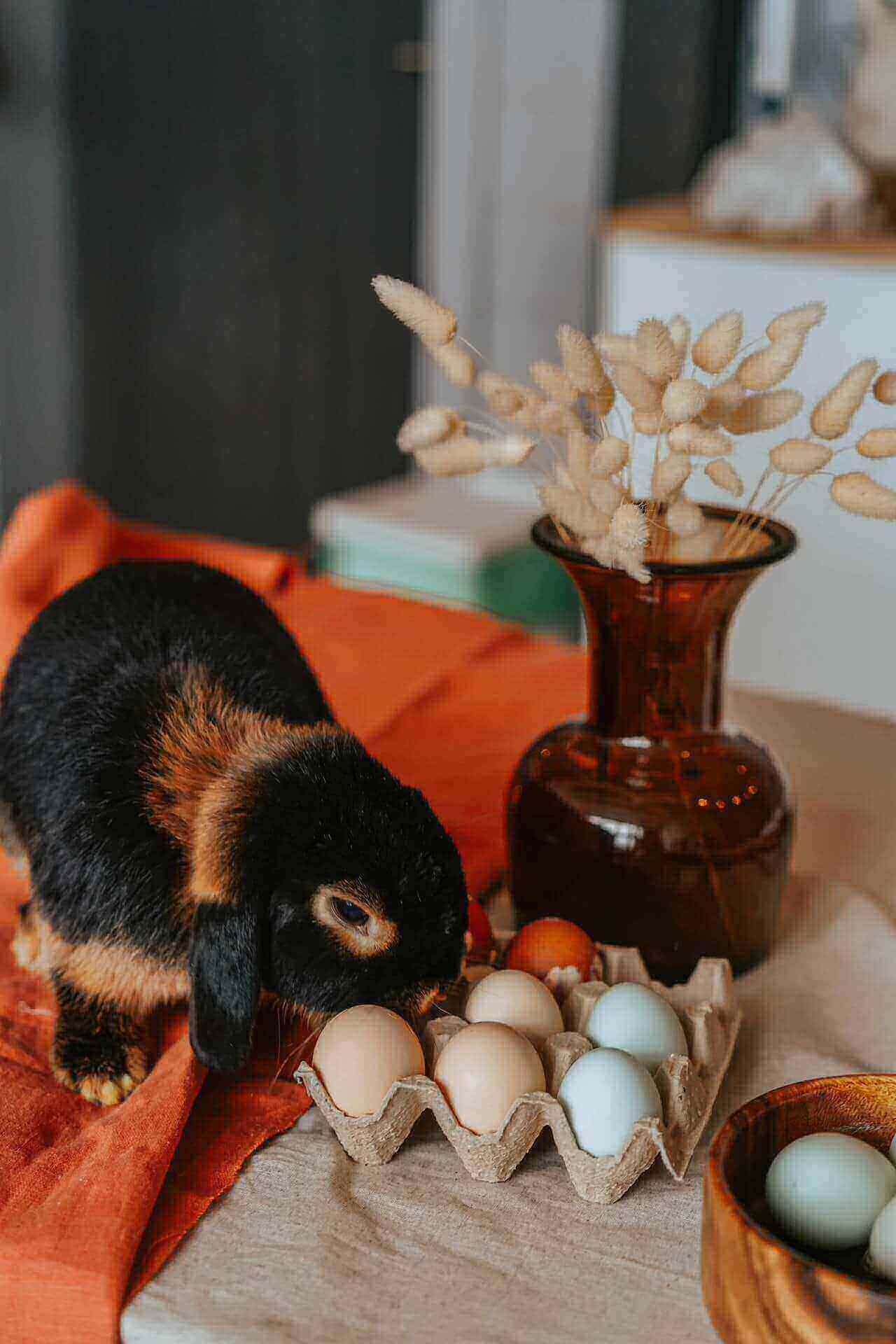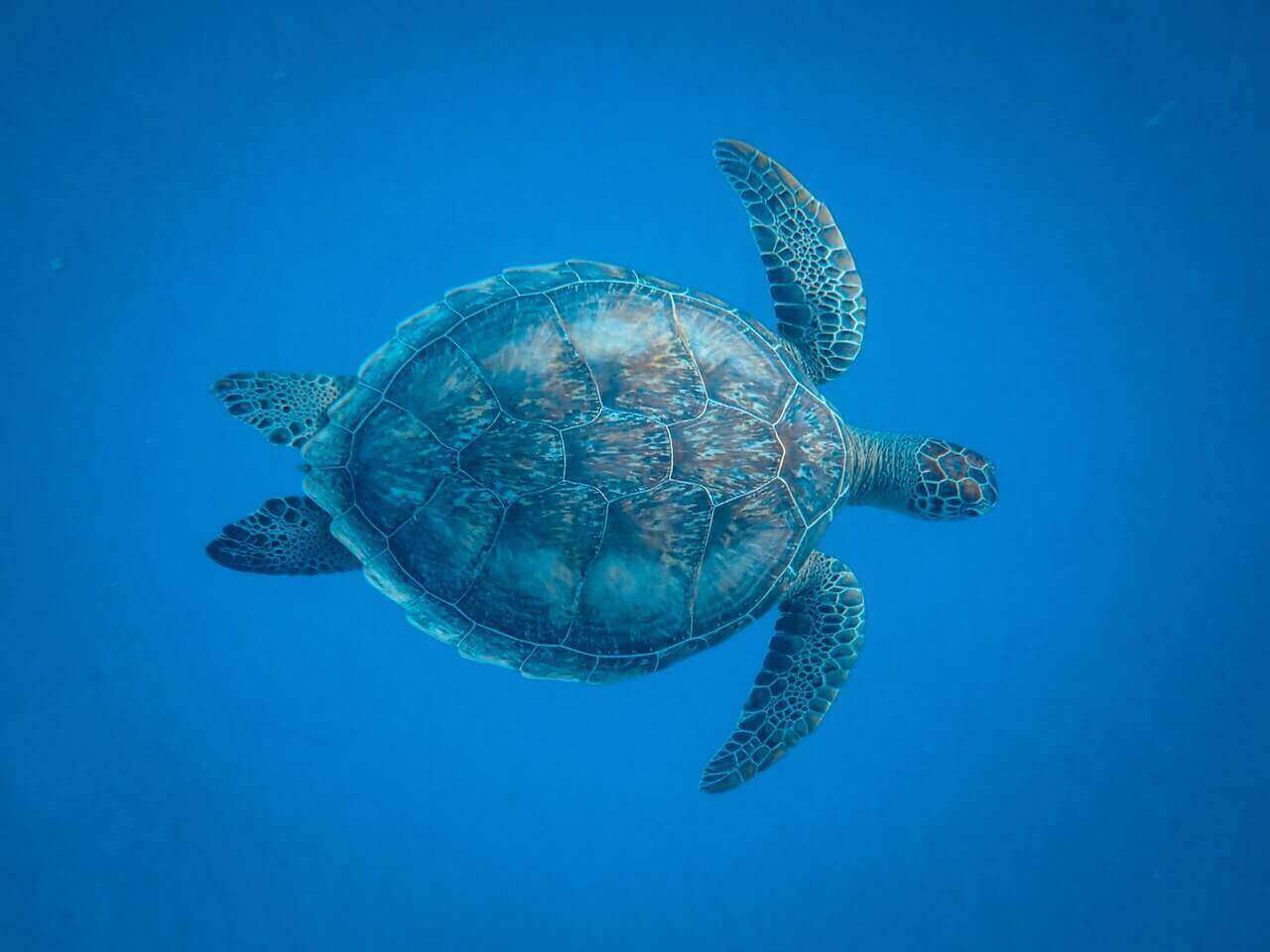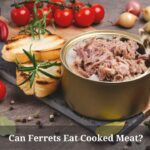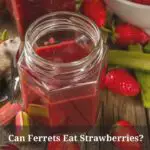Whenever there are discussions on ferret nutrition, one question that tends to come up is on whether the ferrets can eat pumpkin. This article explores that subject comprehensively.
Can ferrets eat pumpkin? Yes, ferrets can eat pumpkin. But they should ideally only have pumpkin as a remedy for issues like firming up loose stools (as in diarrhea) and resolving intestinal blockages. You should avoid feeding ferrets on pumpkin routinely.
It is important to remember that ferrets are carnivores. They therefore shouldn’t eat fruits and vegetables as staples. Yet pumpkin is a fruit (or at least a vegetable, depending on who you ask).
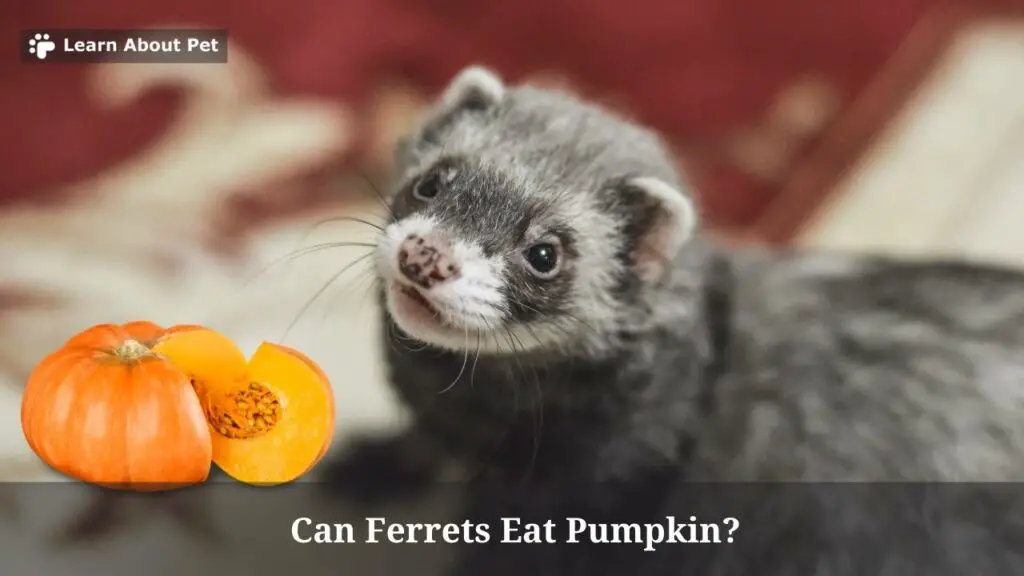
As such, pumpkin is not the sort of thing that ferrets should be eating routinely.
Is Pumpkin Safe For Ferrets To Eat?
Pumpkin for ferrets is quite safe to eat: but only in very small quantities.
People often feed their ferrets on pumpkin – for instance, as part of the popular ferret blockage protocol. And the ferrets don’t seem to experience any noticeable adverse issues after eating pumpkin. At least not in the short term.
That goes to show that in small quantities, pumpkin can be safe for ferrets.
Of course, if you feed ferrets on too much pumpkin, it can be unsafe. It can, in the long term, cause problems such as insulinoma. That is on account of its high carbohydrate content.
Moreover, the high fiber content in pumpkin may, in the long run, cause ferret intestines damage.
Overfeeding on pumpkin for ferrets even has potential to cause kidney problems in the long run…
Thus pumpkin is only safe for ferrets if they eat it in very small quantities. And if they only eat it when need really arises – like in resolving loose stools or blockages problems.
Thus the relation between pumpkin and ferrets is a highly nuanced one. The pumpkin is safe for ferrets in some cases. But its routine usage can, in the long run, cause problems…
Nonetheless, if you research on what is safe for ferrets to eat, you will often find pumpkin in the list.
Is Pumpkin Good For Ferrets To Eat?
Pumpkin – in small quantities and on an as-need-arises basis – can be good for ferrets.
Ferrets with intestinal blockages can get relief when fed on pumpkin as part of a blockage protocol.
Similarly ,ferrets with loose stool problems can get relief, due to the pumpkin’s high fiber content.
Thus to some appreciable extent the ferret pumpkin laxative antidote effect may work well in firming up the stools. That is after the ferret has eaten anything with laxative properties, leading to loose stools.
There is also no denying that there is some carbohydrate and fiber in pumpkin. And this may help a ferret in some cases.
Therefore pumpkin is good for ferrets to that extent.
What Kinds Of Pumpkin Can Ferrets Eat?
Pumpkin may come in many forms: ranging from raw pumpkin to cooked pumpkin, frozen pumpkin to canned pumpkin and pumpkin pie to pumpkin seeds…
This leads to a question on whether all these forms of pumpkin are good for ferrets. Or whether some forms of pumpkin are good for ferrets, while others aren’t.
Let’s examine some of these forms of pumpkin, with regard to their appropriateness for ferrets.
Can Ferrets Eat Raw Pumpkin?
Ferrets shouldn’t eat raw pumpkin. The tough plant fiber in raw pumpkin may turn out to be overwhelming, once in the ferret’s GI tracts.
The raw pumpkin can then end up causing blockages there. And this would be very ironic, especially if you were feeding the ferret on pumpkin to resolve a blockage issue…
In any event, you may encounter considerable trouble getting ferret to eat pumpkin if it is raw.
Sure, you may find some resources on how to raw feed pumpkin to ferrets. But you need to remember that the ferret’s digestive tract is rather short – since the animal is a carnivore.
Thus it is often unable to handle the tough fibers in raw pumpkin.
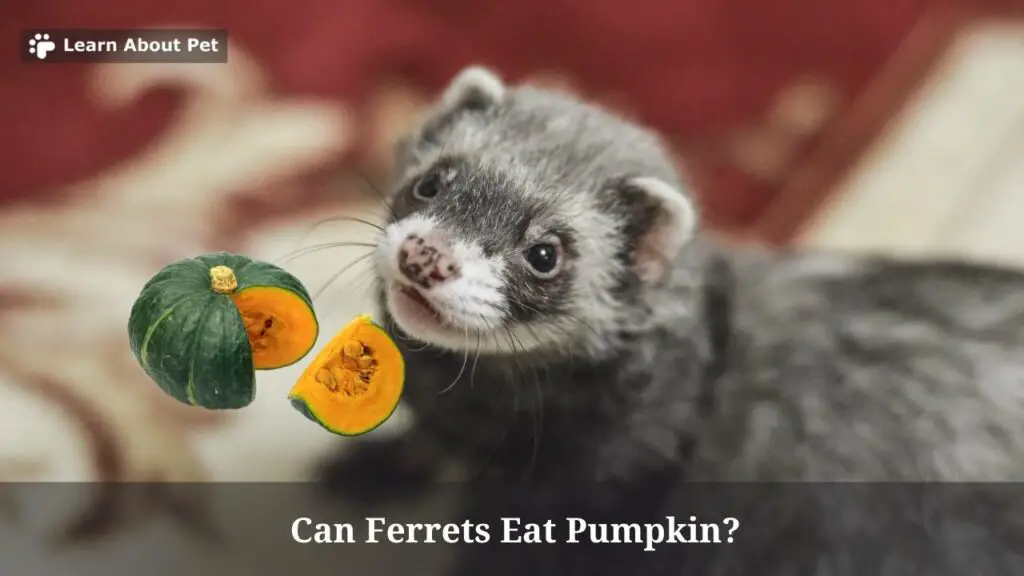
Can Ferrets Eat Cooked Pumpkin?
Often, the pumpkin that people consider giving to ferrets is in cooked form. This leads to a common/frequently asked question: can ferrets have pumpkin if it is cooked?
The answer is ‘yes’, ferrets can eat cooked pumpkin.
In fact, if you have to feed your ferret on pumpkin for any reason, it better be cooked pumpkin.
Cooking softens the otherwise tough plant fibers in the pumpkin. Once softened, they can’t overwhelm the ferret’s digestive system. Therefore it can’t turn into a cause for internal blockage.
Conversely, the tough fibers in uncooked pumpkin can cause blockage issues in ferrets. That is why cooking the pumpkin is essential, before giving it to ferrets.
While cooking pumpkin to give to ferrets, you need to avoid seasonings, such as salt or spices.
Can Ferrets Eat Canned Pumpkin?
Canned pumpkin is good for ferrets – so long as it is 100% pure, and plain/unseasoned.
In the popular ferret blockage protocol, what is used is typically canned pumpkin.
But the ferret can only have canned pumpkin in very small quantities. It should be measured in terms of tablespoons.
Further, the canned pumpkin should ideally only be used in dealing with ‘situations’. That is for instance while trying to resolve blockages or loose stool situations. It shouldn’t be a routine diet item.
Can Ferrets Eat Frozen Pumpkin?
If the pumpkin was frozen raw, it would need to be cooked first. This is in order to soften the tough plant fibers in it. After that, you can feed the ferrets on it.
If the pumpkin was frozen cooked, you will need to thaw it first. After that, you can proceed to let your ferret eat it: in small quantities.
Can Ferrets Eat Pumpkin Pie?
Pumpkin pie is likely to contain seasonings and other things that make it potentially harmful to a ferret.
Thus pumpkin pie may not be the best for a ferret.
Of course, if you are having pumpkin pie, and your ferret comes around, you may be tempted to give a small slice to it. There may be no harm there really.
But routinely feeding your ferret on pumpkin pie can lead to problems down the line.
Can Ferrets Eat Pumpkin Seeds?
Ferrets shouldn’t have pumpkin seeds.
The pumpkin seeds are said to be potentially toxic to ferrets. And they may also cause issues such as blockages, given their size and toughness.
Therefore pumpkin seeds are not good for ferrets at all.
How Do You Feed A Ferret Pumpkin?
Firstly, the pumpkin needs to be well-cooked. This way, the tough plant fibers in it are softened. They therefore can’t cause problems to the ferret.
Now what to do is measure the pumpkin using a tablespoon. Then present it to the ferret in its normal feeding dish.
There are also emergency situations (like when dealing with blockages) when the idea of feeding the ferret on smashed pumpkin using a syringe may be contemplated.
Final Verdict – Can Ferrets Eat Pumpkin
Ferrets are capable of eating pumpkin. Pumpkin is safe (in small quantities and only occasionally) to ferrets. There are also several benefits that a ferret may get after eating pumpkin.
Ideally, ferrets should only eat pumpkin on an as-need-arises basis. That is for instance while trying to resolve loose stool or blockage problems.
But pumpkin should certainly not become a routine meal for ferrets. Remember, pumpkin is technically a fruit. And ferrets, being carnivores, aren’t meant to be routinely feeding on such.
Routine feeding on pumpkin may, in the long run, predispose ferrets to problems such as insulinoma. This is due to the pumpkin’s high carbohydrate content.
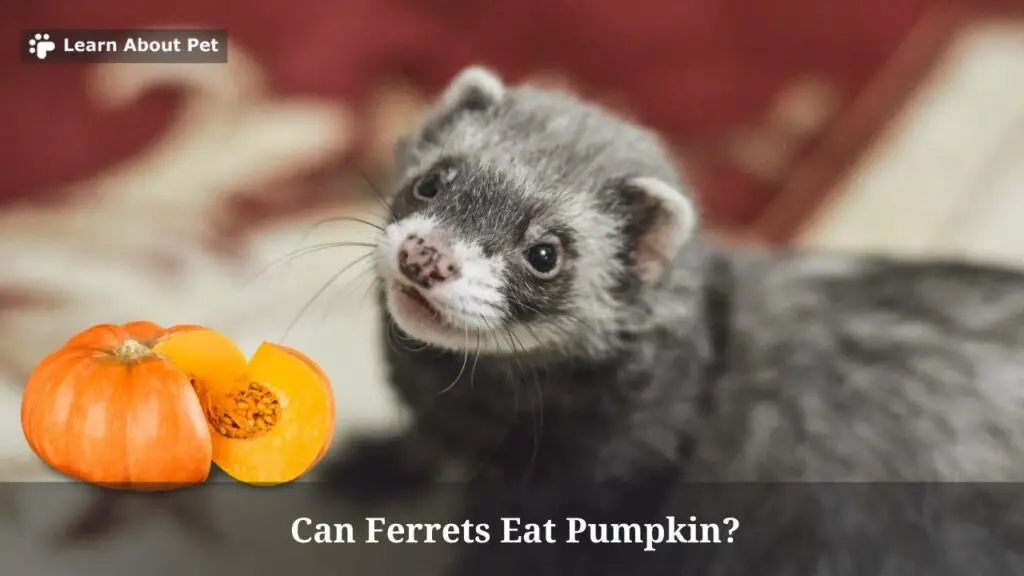
The high fiber content in pumpkin on the other hand may, in the long run, damage the ferret’s intestines.
That is why it is best to feed ferrets on pumpkins only on an as-need-arises basis.
The pumpkin that you feed to a ferret should be pure and plain. It shouldn’t contain seasoning. And it should be well-cooked, in order to soften the tough plant fibers in it, which would otherwise overwhelm a ferret’s digestive system.
As a pet lover, make sure to learn about pet more and give your pet ferret a good and comfortable life!

Welcome to Learn About Pet. My name is Rajkumar Ravichandran and I love all pets, travel, and amazing food. I write about my passion and personal experience caring for multiple pets in this blog! ❤️
Post Disclaimer
DISCLAIMER: THIS BLOG OR WEBSITE, "Learn About Pet", DOES NOT PROVIDE YOU WITH MEDICAL ADVICE AND IS NOT A SUBSTITUTE FOR MEDICAL ADVICE. ALWAYS GET IN TOUCH WITH YOUR PERSONAL VETERINARIAN AND USE INFORMATION HERE AS GENERAL ADVICE.
The information, including but not limited to, text, graphics, images and other material contained on this website are for informational purposes only. No material on this site is intended to be a substitute for professional veterinary advice, food recommendation, diagnosis, or treatment. Always seek the advice of your veterinarian or other qualified health care provider with any questions you may have regarding a medical condition or for pet food related questions.

